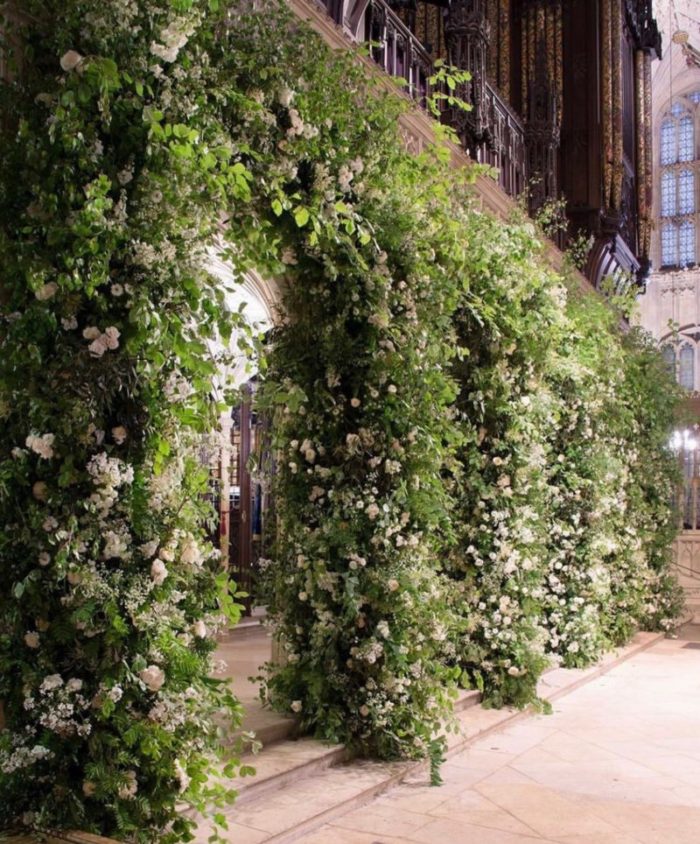What will weddings look like in the coming months… Weddings and parties which are adaptable, focus on loved ones, and simplicity will be winners. We are in uncharted waters: the industry has never seen this before, and all signs point to the likelihood that lavish entertainment as we know it isn’t coming back for a while.
People depend on parties and weddings –it’s where a large part of our social lives takes place, where landmark events are celebrated, where we meet new friends. But by the end of this pandemic, everything will have changed. It is certain that many industries including the multi-billion-dollar juggernaut wedding one, will be forced into a leaner way of producing services, and professing a more frugal business sense. As people reevaluate priorities coming out of a lockdown, the industry is using this opportunity to reconsider how things will be done. But so are consumers. From extortionate wedding costs, and overwhelming pressure from social media to have ‘the perfect day’- we need to look at what we would like to save about the industry, and its flaws. Entertaining that focuses on loved ones and simplicity will survive. Read more, ‘The Wedding Social Media Rules All Brides Need To Know.’
Lavish events are outdated.
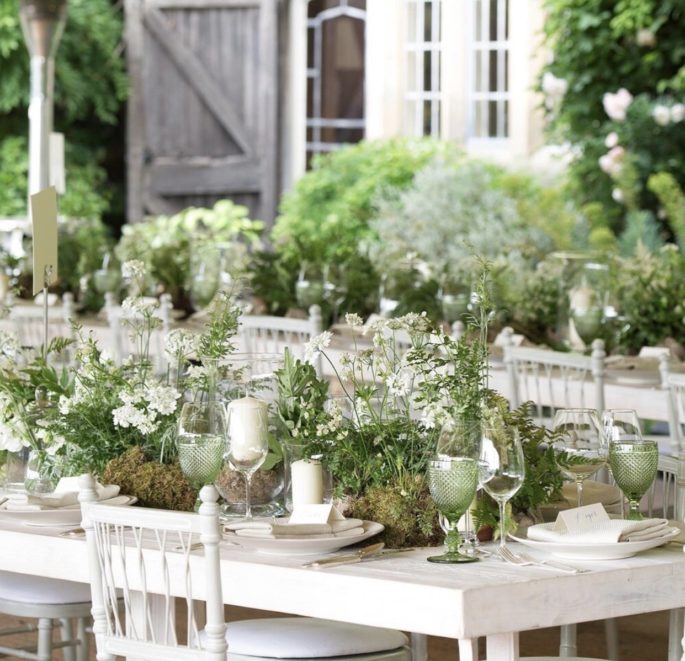
Tablescape by florist Phillipa Craddock, image via @philippacraddock Instagram
This pandemic may change weddings for years to come. Disasters are known as powerful ignition tools for radical ways of transforming social and business practices.
The comfort of being at and working from home over the past few months, wasting time instead of money, has led people away from their addiction to material things and into a realm of sharing, caring and making. Making food, enjoying music, and using what they have has become the centre of life; learning the improvisation skills that ignite a more creative culture. Most people don’t want to go back to the same old society, and long to change their lives forever. It’s about putting people before profits. This will carry through to the way we entertain and tie the knot.
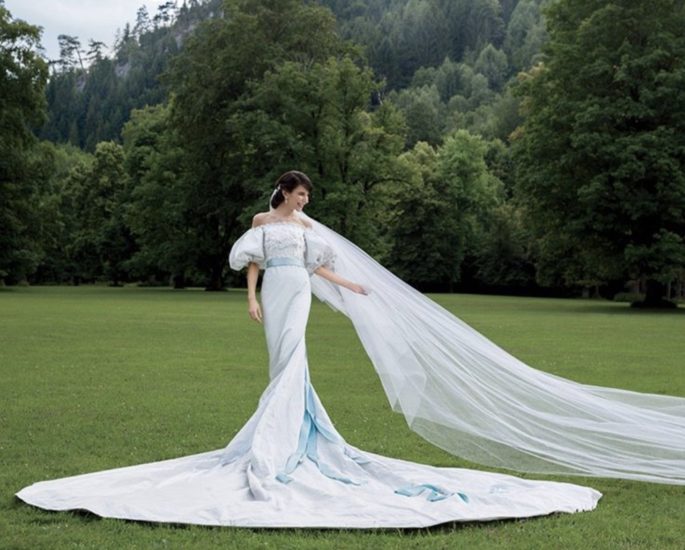
From extortionate wedding costs, and overwhelming pressure from social media to have ‘the perfect wedding’- we will look at what we would like to save about the industry, and its flaws. Caro Sieber’s wedding. Photographed by Robert Fairer, Vogue, September 2013.
Anti-Instagram Weddings
We will ditch the “insane” practice where everything is done for social media. Pre-pandemic every event on the path to getting married was up for documentation on Instagram; the proposal, the engagement party, even the cake tasting – brides have been under a lot of pressure to have the perfect day from the part where they say “I do” to how they look, the after party, everything. There is makeup, hair, wedding dresses, (which have become more expensive in recent years), location, caterer, invitations, florist, table setting, cake, transport, photographer, and so much more to consider. Plus extravagant hen’s parties. Wedding planning can be a mentally and physically taxing job which may explain why one in three couples hired a wedding planner. A survey conveyed by pinterest noted that its user base conducts 378 million wedding-related searches on the website last year.
Thanks in part to Instagram, weddings are so much more visible then they were in the past. It’s not just your friends and family who will see it; even people you haven’t even invited might be watching. Couples will increasingly celebrate in simpler ways that will make them feel comfortable. Anyone entertaining in a blindly greedy, lavish way should be cautious – they are totally out of touch.
Big, lavish weddings are often about doing it to please others.
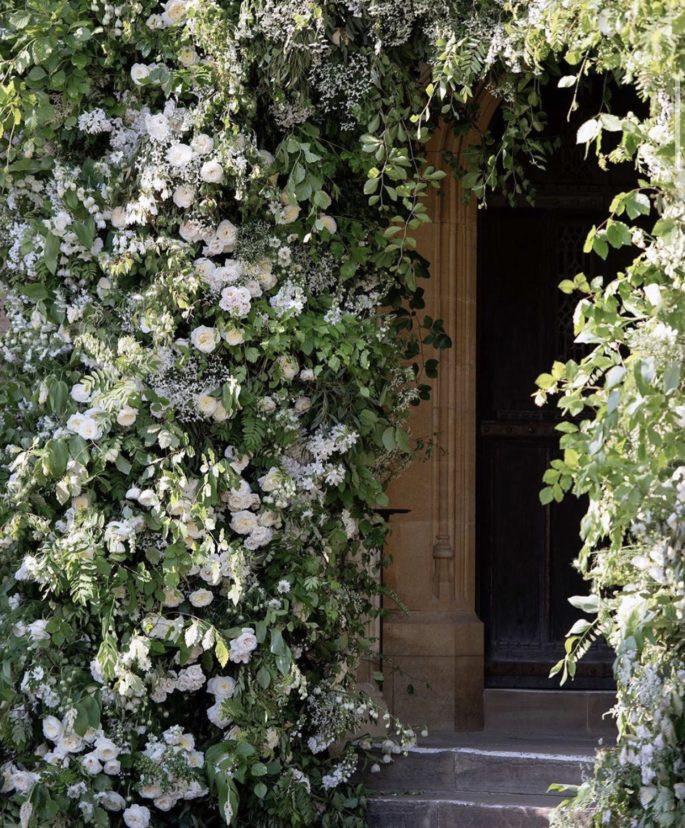
Flowers at St George’s Chapel at Windsor Castle for Harry and Meaghan’s wedding on May 18, 2018. Image via @philippacraddock Instagram
Virtual Weddings
If your wedding was planned as a big gathering in the next couple of months, and you don’t want to cancel, now is the time to pivot to a virtual ceremony. The first question to ask is: Who is this wedding for? Which leads us to the guest list.
Without physical limits, you can rethink whom we invite to witness a marriage ceremony. It’s an incredible opportunity to make your wedding more inclusive than it would have been originally.
If you originally wanted to keep your wedding guest list limited with an intimate ceremony where you know everyone in attendance, so, unfortunately, plus-ones were out. However, the pandemic changed everything. To their surprise, they felt the pull to include more of their community in their wedding, not less. They decided to hold a socially distant wedding ceremony from their home. Instead of feeling protective over their day, they felt that the more people witnessing their nuptials, the merrier it would feel. They had one goal: To look out and not just see our friends who were physically present, but also the faces of our family and friends back home who aren’t able to travel to be there.
Your minister or celebrant can still officiate — just now over Zoom.
Guests attending in-person will stand six feet apart. The couple asked the dozens of guests tuning in virtually to wear white from the waist up and to compose a handwritten love letter for the couple. They were also instructed to write one word on the back of the envelope which they’ll show onscreen during the ceremony.
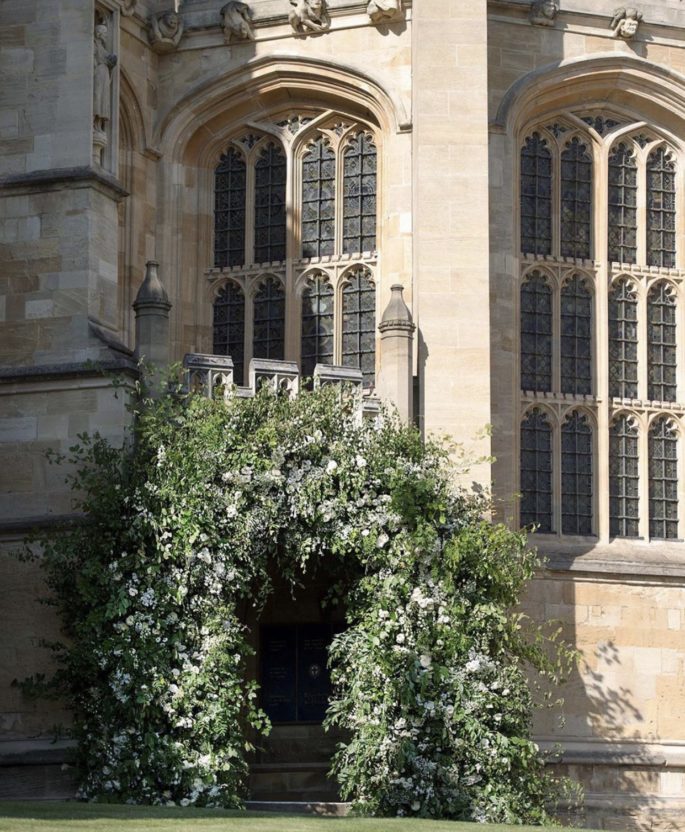
Flowers at St George’s Chapel at Windsor Castle for Harry and Meaghan’s wedding on May 18, 2018. Image via @philippacraddock Instagram
What Can You Do If You Had Your Heart Set On Marrying on a Certain Date?
You carefully chose your wedding date for sentimental reasons and don’t want to postpone or cancel. You can still make it happen. Your wedding might look different than you’d envisioned, but you can almost certainly still get married on the original date you had in mind.
Get married at home, even virtually. Options, of course, will vary by state. Do your research in advance to understand your local requirements. You’ll want to be sure that any type of ceremony, legal or not, is performed in accordance with your local laws and guidelines regarding group gatherings.
A garden wedding with just you and your beloved, the celebrant and a few loved ones 1.5 metres apart from one another is one option. The limitations right now on what’s possible are being set by what’s legal and safe, but as long as you’re within those boundaries the sky’s the limit to how creative you can get.
How Can I Think About Restructuring My Wedding
A very small wedding might do . There is an overall trend towards minimalism and simplicity, and that goes for weddings, too. Planning a traditional wedding takes a great deal of time and energy. So many people are overwhelmed just dealing with the pressures of day-to-day life; they simply don’t want the added stress of orchestrating a large event. Decision fatigue is real; a tiny wedding helps to alleviate some of that.
We think the world will see a revival of small-scale, private weddings and events. The impulse to avoid stress is often the starting point for going smaller. Details for big events can keep snowballing. The visual component is important. It’s now not so much about so many guests. Remember, crafting the dream wedding isn’t exactly cheap. While costs have ballooned, expect guest lists to shrink to smaller nuptials that retains the structure of a traditional wedding, except on a more intimate scale – with a ceremony of 15 – 60 guests. Read more, ‘Yes You Can! Plan A Wedding For Less And No-One Would Know.’
There are many benefits to streamlining your big day.
More And More Couples Will Get Married In Private
But small scale doesn’t necessarily mean drama-free. Be prepared to manage the expectations of friends and family members that thought they would be invited but didn’t make the cut. Likewise, small micro weddings still cost money. Even though there’s less mouths to feed, companies still charge wedding prices for wedding services. Plus, you still have to worry about the weather. After all, it still costs a lot of cash to look ~casual~ and chic.
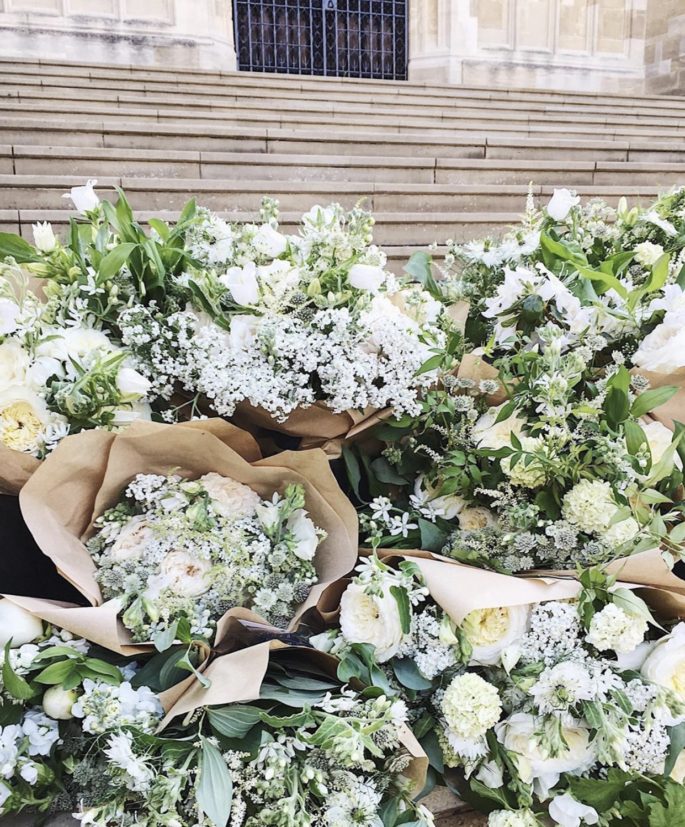
Florist Philippa Craddock preparing for her install for Harry and Meaghan’s wedding on May 18, 2018. Image via @philippacraddock Instagram
The Case For Private weddings
People will want weddings that are subtle, classic, and not “too shouty”. They will go for beautiful deep colours and dim lighting to create a shadowy atmosphere that isn’t meant to translate well on Instagram screens. They will deliberately go dark for evening events to discourage people from sharing images on Instagram. There will be little contrast between colours, pattern and finish, yet a lot of richness in texture and tactility. Weddings will be deeply rooted in intimate interactions, singular moments, and glamour. These designs signal the end of a flashy “look at me” era that canonized experiences and spaces crafted expressly for sharing on social media. Going forward, consumers will respond to events that encourage them to live in the moment, rather than experiencing the world through the lens of their phone.
There’s two ways to look at it: Either the economic hardship of the pandemic will result in simpler gatherings next year, with less expense and less risk. Or these months of isolation will underscore the importance of gathering, creating a hunger for meaningful shared events. To move forward, we must start by examining what we would like to save about the wedding industry, giving space to the things that nourish us and our communities, and discarding what we believe doesn’t deserve to survive. After all, the real danger the industry faces isn’t annihilation – the danger is that it comes back the same as it was before. Too much focus on ….
Lockdown has given the billion-dollar industry a chance for introspection.
As dire as the situation is with many businesses potentially closing down, the hope is the ones that survive and prosper will offer a fresh approach to the dining landscape and provide value and purpose within the community.
You’ve been holding off to see if it will be safe to host your wedding, before reluctantly postponing it. Where do you begin?
Start with the venue. As the most important component of your celebration, the availability of your event space will most likely dictate your new wedding date. Get three dates that your venue has open, then go over the days with your vendors to determine who is available when. Being flexible — perhaps picking a Thursday, Friday or Sunday, instead of a peak Saturday — can make it easier to move your celebration date.
How to Resolve Conflicts With Vendors
One of your vendors is unwilling to reschedule, cancel or issue a refund. The solution: Refer to your contract before negotiating. There are cancellation clauses in almost every vendor’s contract. If you cancel outright, you may lose your deposit, but your vendor should be able to work with you if you decide to postpone. You may be able to ask for extra time or services that wasn’t initially included. For example, perhaps you can ask your photographer for a free engagement session or photography for your day-after brunch at a reduced rate.
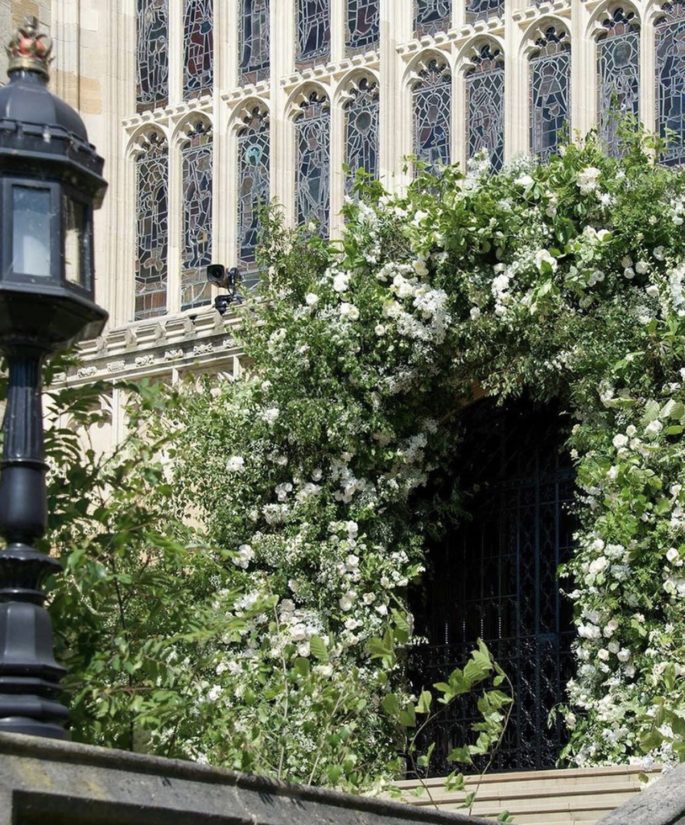
Flowers at St George’s Chapel at Windsor Castle for Harry and Meaghan’s wedding on May 18, 2018. Image via @philippacraddock Instagram

